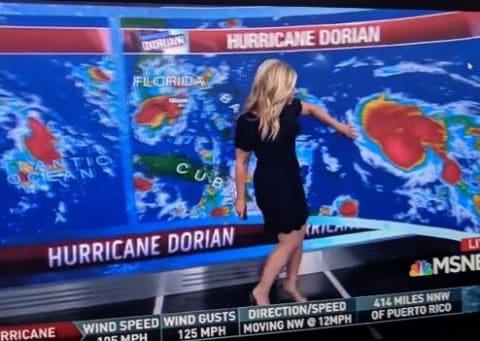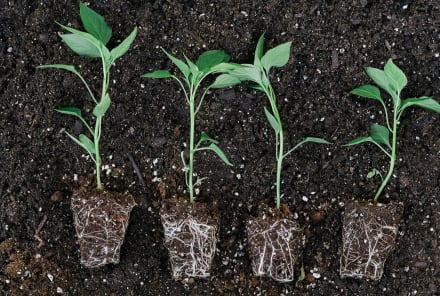Advertisement
I'm A Meteorologist & This Is How Climate Change Is Affecting Your Health


As a TV meteorologist covering Hurricane Dorian for MSNBC in August 2019, I reported the latest updates on the storm live from the network's New York City studios. The set featured four gigantic projection walls, each depicting various views and data points. Even if you didn't hear me describe the huge hurricane, a quick glance at your TV screen with its bold "Breaking News" banner would have given you a sense of how dangerous this storm was as it tore through the tiny islands of the Bahamas.

Hurricane Dorian showed why conveying urgency is paramount when relaying weather safety information. Throughout my career, I've done this on both local TV stations and national cable news networks. In 2012, I wrote my first book, Extreme Weather, which focused on how to survive all types of natural disasters.
In the years that followed, I traveled the country and connected with people from all over the world on social media. They shared their personal stories and firsthand experiences of living through destructive extreme weather events and natural disasters. I was often struck by survivors' courage in facing not only the physical loss of a home or business but also the emotional anguish that remained years after the storm or fire was over.
Climate change would often come up in these conversations. People would ask me: Is climate change responsible for the increase in extreme weather events? This set me on a new path of exploring the links between climate change, extreme weather, and human health.
Long story short: Climate-induced disasters are on the rise.
Global scientists conclude that certain heat waves, floods, and droughts1 can be directly linked to human-caused climate change, and a warming world is increasing the intensity and duration of extreme weather events.
And climate-induced disasters are only one way that doctors say climate change is affecting our mental and physical health right now. Others include greater exposure to heat-related illness and more potent allergens, plus the increased potential for infectious disease transmission. And yet, the Medical Society Consortium on Climate and Health reports that only about one in three Americans is aware that these climate-related hazards currently exist.
The consortium, which represents hundreds of thousands of medical doctors and health professionals, believes that these climate-related health risks need to be communicated to the public—and quickly. "We need much more urgency. People need to understand so much more than they do right now…" Mona Sarfaty, M.D., MPH, the consortium's executive director, once told me.
These sentiments, along with my experience as a TV meteorologist and journalist, led me to write my new book, Taking the Heat: How Climate Change Is Affecting Your Mind, Body, and Spirit and What You Can Do About It.
The physical climate threats that we should be talking about more.
To write this book, I consulted climate research and interviewed top doctors, medical professionals, and scientists. I aimed to spread a hopeful message about how we can all do our part to mitigate climate change—but not without first facing what we are up against.
For example, does allergy season seem to start earlier and end later to you? It's not your imagination. Climate researchers have found that allergy season2 is lasting about 20 days longer in many U.S. cities than decades ago.
And pollen isn't the only irritant to your nose and throat. Wildfires, which are becoming more frequent and widespread due to climate change, emit tiny particulate matter, measuring a mere 2.5 micrometers in diameter. These particles—called PM 2.5—are four times smaller than dust or pollen, less than half the size of a grain of sand, and about 30 times smaller than the diameter of a human hair. PM 2.5 can reach deep into your lungs and bloodstream, raising the risk of heart disease3, lung disease4, and diabetes5.
A 2018 study from Cardiovascular Research Technologies found that the rate of adults 65 years and older visiting the ER for a heart attack increased by 42% in the day following a wildfire. Some estimate that breathing in wildfire smoke is the equivalent of smoking seven cigarettes a day.
A hotter planet also means longer-lasting heat waves in the summer. For those living in cities, temperatures can rise up to 10 or 20 degrees higher than in suburban or rural areas. Heat-driven health issues are projected to worsen due to climate change, and the average American citizen may experience between four and eight times as many days above 95 degrees by the year 2030.
Climate change affects our mental health, too.
In researching and writing this book during the height of the pandemic, I believed it was important to delve into the topic of mental health, which is an integral part of overall well-being.
When it comes to climate change, just the thought of our planet warming triggers feelings of anxiety, especially in young people. For those with eco-anxiety, a term described by the American Psychiatric Association (APA) as the "chronic fear of environmental doom," viewing images and watching media reports of any type of weather-related destruction can be triggering. A recent global survey of 10,000 young people between the ages of 16 and 25 found that 56% believe that "humanity is doomed."
Mental health experts say that spending time in nature, whether it's walking, gardening, or participating in an eco-friendly activity, can be helpful in coping with eco-anxiety. When these activities are done in a group setting, there is the additional benefit of potentially finding like-minded people to express mutual climate concerns.
Scientific studies also indicate that practicing mindfulness and meditation can be beneficial in reducing the emotional anguish6 you might feel thinking about our climate. Even in the darkest times, research shows that writing down what you are grateful for can refocus attention and improve mood too.
The bottom line.
Climate change is affecting both the planet we live on and each of us individually, mind, body, and spirit. But it's not too late to take action to mitigate the effects of climate change and optimize our own personal health and wellness.











